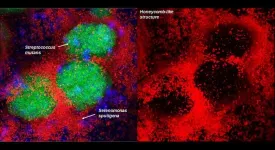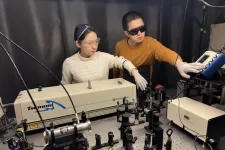(Press-News.org) PHILADELPHIA— Historically, scientists have studied how cells develop and give rise to specialized cells, such as heart, liver, or skin cells, by examining specific proteins. However, it remains unclear how many of these proteins influence the activity of hundreds of genes at the same time to turn one cell type into another cell type. For example, as the heart develops, stem cells and other specialized cells will give rise to heart muscle cells, endothelial cells (lining of blood vessels), smooth muscle cells, and cardiac fibroblasts. But the details of this process remain mysterious.
As a result of a $6 million, seven-year grant from the National Heart, Lung, and Blood Institute of the National Institutes of Health (NIH), researchers from the Perelman School of Medicine at the University of Pennsylvania are launching new efforts to uncover how the development and maintenance of heart cells is influenced by DNA. These insights could help drive future research on new therapies for cardiac disease.
Penn Medicine researchers propose that nuclear architecture, which governs the availability of hundreds of genes within a cell, plays a critical role in achieving the proper identity of a cell. Specifically, they plan to study how the packaging and organization of DNA in 3D—meaning understanding how DNA folds and twists in a complex way to fit into the tiny space of a cell nucleus—impacts cell development. The work is supported by their previous research, which shows that nuclear architecture governs cardiac cellular identity during both development and disease.
“This research has the potential to significantly advance our understanding of how cardiac cells arise and keep their identity for a lifetime,” said Principal Investigator Rajan Jain, MD, an assistant professor of Medicine and Cell and Developmental Biology in the Perelman School of Medicine at the University of Pennsylvania. “By viewing congenital heart disease and other cardiac diseases through the lens of how DNA is organized in the cell, many therapeutic opportunities that have remained untapped may come to light.”
The way the nucleus is organized inside cells plays a crucial role in controlling the genes that determine cell identity. The nucleus acts like the command center of the cell, controlling what genes are accessible or available for use.
The Jain lab’s work suggests that the way the DNA is folded and arranged within the nucleus can determine which genes are accessible and active, influencing the cell's identity. The way the DNA is folded and organized can be compared to a complex origami structure, where each fold and crease determines the final shape and function. The research aims to unravel the role of genome folding in controlling cell behavior, particularly in heart cells, and to identify key processes involved in this regulation. Researchers will also explore how the spatial positioning of DNA affects gene activity during the development of heart cells. By studying this process, researchers can examine how the identity of heart cells is maintained. This process is important for our overall health; incorrect development of heart cells or altering its identity could contribute to congenital heart disease or cardiomyopathy.
“As I trained it was always assumed that therapies can’t target specific proteins in the nucleus, but that has changed over the last few years,” Jain said. “Leveraging those advancements and past work as an inspiration, I hope this research will eventually allow us to design new medicines that will directly target how DNA is organized.”
This research is supported by the National Heart, Lung, and Blood Institute of the NIH (R35HL166663).
###
Penn Medicine is one of the world’s leading academic medical centers, dedicated to the related missions of medical education, biomedical research, and excellence in patient care. Penn Medicine consists of the Raymond and Ruth Perelman School of Medicine at the University of Pennsylvania (founded in 1765 as the nation’s first medical school) and the University of Pennsylvania Health System, which together form a $9.9 billion enterprise.
The Perelman School of Medicine is consistently among the nation's top recipients of funding from the National Institutes of Health, with $546 million awarded in the 2021 fiscal year.
The University of Pennsylvania Health System’s patient care facilities include: the Hospital of the University of Pennsylvania and Penn Presbyterian Medical Center—which are recognized as one of the nation’s top “Honor Roll” hospitals by U.S. News & World Report—Chester County Hospital; Lancaster General Health; Penn Medicine Princeton Health; and Pennsylvania Hospital, the nation’s first hospital, founded in 1751. Additional facilities and enterprises include Good Shepherd Penn Partners, Penn Medicine at Home, Lancaster Behavioral Health Hospital, and Princeton House Behavioral Health, among others.
Penn Medicine is powered by a talented and dedicated workforce of more than 47,000 people. The organization also has alliances with top community health systems across both Southeastern Pennsylvania and Southern New Jersey, creating more options for patients no matter where they live.
Penn Medicine is committed to improving lives and health through a variety of community-based programs and activities. In fiscal year 2021, Penn Medicine provided more than $619 million to benefit our community.
END
Philadelphia — Collaborating researchers from the University of Pennsylvania School of Dental Medicine and the Adams School of Dentistry and Gillings School of Global Public Health at the University of North Carolina have discovered that a bacterial species called Selenomonas sputigena can have a major role in causing tooth decay.
Scientists have long considered another bacterial species, the plaque-forming, acid-making Streptococcus mutans, as the principal cause of tooth decay—also known as dental caries. However, in the study, which appeared 22 May in Nature Communications, the Penn Dental Medicine and UNC researchers showed that S. sputigena, previously associated ...
CHAMPAIGN, Ill. — Like many ecological scientists, University of Illinois Urbana-Champaign plant biology professor James O’Dwyer has spent much of his career searching for ways to measure and predict how specific plant communities will fare over time. Which species in a diverse population will persist and coexist? Which will decline? What factors might contribute to continuing biodiversity?
In a new study reported in the journal Nature, O’Dwyer and his colleague, U. of I. graduate student Kenneth Jops, report the development of a method for determining ...
The Princess Máxima Center's Board of Directors, Research management and the clinical directors warmly invite you to attend our interdisciplinary symposium, to celebrate the first five years existence of the Princess Máxima Center for Pediatric Oncology.
This 2-day Scientific Symposium will take place on June 12th and 13th 2023 in the Jaarbeurs in Utrecht. There will be presentations from well-known speakers covering the various disciplines within the field of pediatric oncology and beyond, showcasing latest developments and technologies.
This event will create ...
INDIANAPOLIS – The pandemic has placed a spotlight on public health -- its workforce, infrastructure and underlying information systems designed to collect, analyze and manage public health data.
Informatics, health information technology and public health experts from across the nation convened at an American College of Medical Informatics symposium concluded that how information is received and shared by public health agencies is overdue for “a strategically designed, technology-enabled, information infrastructure for delivering day-to-day essential public health services and to respond effectively to ...
Quantum computing uses the principles of quantum mechanics to encode and elaborate data, meaning that it could one day solve computational problems that are intractable with current computers. While the latter work with bits, which represent either a 0 or a 1, quantum computers use quantum bits, or qubits – the fundamental units of quantum information.
“With applications ranging from drug discovery to optimization and simulations of complex biological systems and materials, quantum computing has the potential to reshape vast areas of science, industry, and society,” says ...
Eczema is an inflammatory skin condition that often affects infants as young as one to two months. Among the various types of eczema seen in infants, early-onset atopic dermatitis (AD), characterized by psychological stress and sleep disorders, is particularly concerning. Studies have, in fact, identified that if left untreated, AD can increase the risk of allergic diseases such as food allergies and asthma—a progression also known as the “atopic march”. Early diagnosis and intervention of early-onset AD is needed to ensure the infant’s psychological and physical ...
The skies aircraft fly through are bumpier today than four decades ago, scientists have found, after producing a new analysis showing that turbulence has increased as the climate changed.
New research from the University of Reading shows that clear-air turbulence, which is invisible and hazardous to aircraft, has increased in various regions around the world.
At a typical point over the North Atlantic – one of the world’s busiest flight routes – the total ...
Washington, June 8, 2023—For years, parents looking for data to compare the academic quality of schools for their children had one primary measure to turn to: average student scores on standardized tests. However, these scores are often related to factors that have nothing to do with instructional quality—such as family income or racial and ethnic background—and push parents toward schools that are Whiter and more affluent, exacerbating school segregation in the U.S. As a result, many education ...
A University of Massachusetts Amherst public health researcher has updated and validated the widely used Pregnancy Physical Activity Questionnaire (PPAQ) to improve the measurement performance of this self-report physical activity method.
Lisa Chasan-Taber, professor and chair of biostatistics and epidemiology, and her research group used novel and innovative tools – an advanced accelerometer and wearable camera – to assess PPAQ performance. The researchers developed the PPAQ in 2004 as the first validated pregnancy physical activity questionnaire. Listed on the UMass Amherst timeline ...
A team led by University of Minnesota Twin Cities scientists and engineers discovered a new method for tuning the thermal conductivity of materials to control heat flow ”on the fly.” Their tuning range is the highest ever recorded among one-step processes in the field, and will open a door to developing more energy-efficient and durable electronic devices.
The researchers’ paper is published in Nature Communications, a peer-reviewed scientific journal covering the natural sciences.
Just as electrical ...






